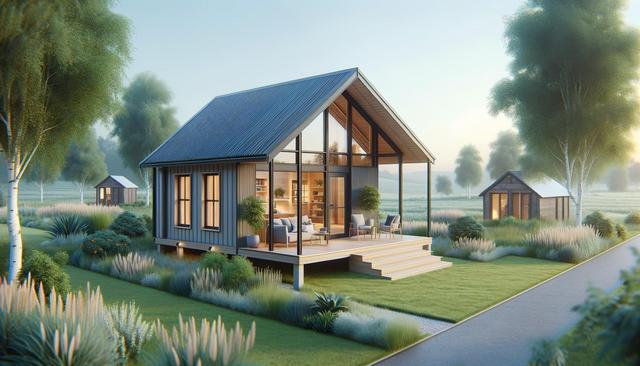Understanding the Basics of Modular Homes
Modular homes are a form of prefabricated housing constructed off-site in a controlled factory environment and then transported to the final location for assembly. Unlike traditional homes built entirely on-site, modular homes are made up of pre-built sections called modules. These modules are designed to fit together seamlessly, offering a sturdy and efficient building process. Because they are built indoors, modular homes are less exposed to weather delays and environmental damage, often resulting in a faster construction timeline and reduced material waste.
One of the most significant advantages of modular homes is their adherence to local building codes and regulations. Each module is engineered and inspected to meet or exceed the standards of conventional site-built homes. This ensures safety, durability, and long-term value for homeowners. Additionally, the streamlined nature of modular construction often leads to lower labor costs and more predictable budgeting, making it a practical choice for many buyers.
The Versatility of Modular Design
Modular homes offer remarkable design flexibility, making them suitable for a wide range of housing needs and lifestyles. From compact single-story units to expansive multi-level residences, these homes can be customized in countless ways. Homeowners can choose from various layouts, finishes, and architectural styles, allowing them to personalize their living space without the constraints typically associated with traditional construction.
The modular approach also allows for future expansion. As needs change, additional modules can be added, enabling families to grow into their home without having to relocate. This modular adaptability supports both short-term functionality and long-term living goals. Some of the areas where modular designs excel include:
- Urban housing developments
- Remote or rural homes
- Eco-conscious or off-grid living
- Accessory dwelling units (ADUs)
Whether for a primary residence, a vacation home, or a rental property, modular homes can be tailored to match the purpose and setting.
Affordability Without Compromise
Cost-effectiveness is one of the key drivers behind the growing interest in modular homes. Due to the efficiencies of factory production and minimized construction time, these homes often present a more affordable alternative to traditional housing. The controlled manufacturing process reduces labor costs and material waste, which can significantly lower the overall price point.
Additionally, many modular homes are designed with energy efficiency in mind. Features such as high-performance insulation, energy-efficient windows, and modern HVAC systems can contribute to lower utility bills over time. These built-in efficiencies not only reduce operational costs but also support environmental sustainability. Some of the financial advantages of modular homes include:
- Predictable pricing with fewer unexpected costs
- Reduced construction loans and interest payments
- Lower maintenance expenses due to quality control
- Potential eligibility for green building incentives
By offering a balance between affordability and quality, modular homes have become a viable solution for a wide demographic of homebuyers.
Construction Speed and Project Management
Speed is another compelling advantage of modular homes. Traditional construction projects can face delays due to weather, labor shortages, or supply chain disruptions. In contrast, modular homes are built in a factory setting where construction schedules are less likely to be disrupted. This efficiency can reduce overall project timelines by several weeks or even months.
Once the modules are completed, they are transported to the building site and assembled quickly, often within just a few days. This rapid deployment is particularly beneficial for developers working on tight deadlines or individuals needing timely housing solutions. Additional benefits of modular construction include:
- Improved project oversight and timeline predictability
- Simultaneous site preparation and module construction
- Reduced impact on surrounding neighborhoods during building
- Streamlined permitting and inspection processes
These advantages make modular homes an attractive option for both private homeowners and larger-scale housing projects.
Sustainability and Eco-Friendly Living
Modular homes support sustainable building practices in numerous ways. The factory-controlled environment allows for precise use of materials, resulting in less waste compared to traditional construction. Additionally, many modular home manufacturers prioritize the use of eco-friendly materials and energy-efficient systems, contributing to a reduced environmental footprint.
Modular homes can also be designed to meet or surpass environmental certifications, providing homeowners with peace of mind about their ecological impact. Green features commonly integrated into modular designs include:
- Solar panel compatibility
- Low-VOC paints and finishes
- Water-saving fixtures
- Passive heating and cooling strategies
For individuals and families seeking a more sustainable lifestyle, modular homes offer a practical and attainable path toward eco-conscious living. The combination of reduced waste, energy savings, and long-term durability supports both environmental and financial goals.
Conclusion: A Smart, Flexible Housing Choice
Modular homes continue to gain popularity as a flexible, affordable, and forward-thinking housing solution. Their ability to adapt to various lifestyles, budgets, and environments makes them an appealing choice for a wide array of homebuyers. Whether you’re seeking a custom-designed residence, a sustainable living option, or a faster route to homeownership, modular homes provide a well-rounded solution without compromising on quality or design potential. As the housing market evolves, modular homes stand out as a practical approach to modern living with long-term value.




Leave a Reply